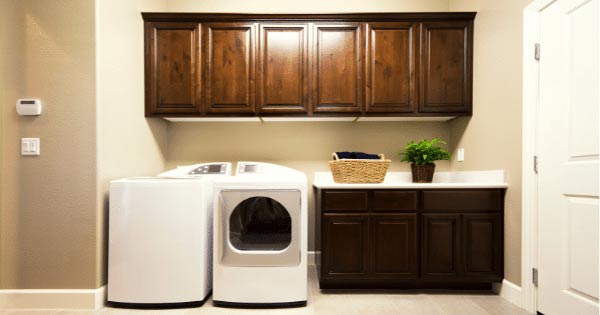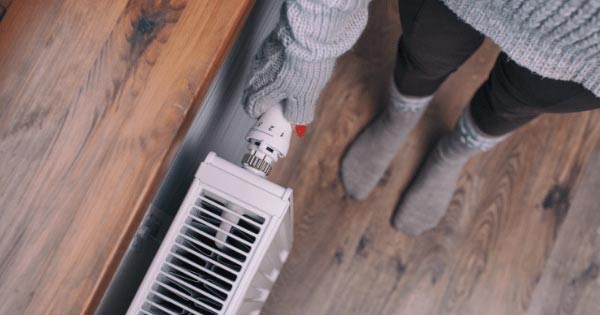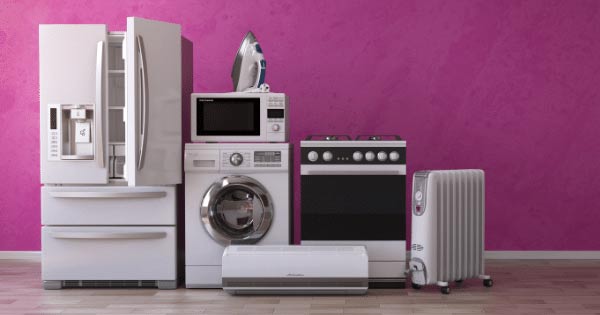Is there anything more frustrating than your washing machine breaking down in the middle of a cycle or your refrigerator dying in the middle of the night? Appliance repairs are not only inconvenient – and seem to only happen at the most inconvenient time – they can also be expensive. Fortunately, regular maintenance can help keep your appliances in good working order for years to come.
No one wants to deal with a broken device in the dead of winter… that’s why fall is the perfect time to do a quick check on all your appliances. Don’t worry, you don’t have to be a master mechanic; most of these maintenance tasks are easy to do on your own.

Laundry Room
Dryers need proper airflow in order to function. When the filter or exhaust is blocked, the heat buildup can cause a fire. Nearly 17,000 clothes fires are reported each year, according to the National Fire Protection Association. Keep your dryer from becoming a fire hazard by following these steps.
-
- Unplug your dryer if it’s an electric model. If it’s a gas model, turn off the gas.
- Pull the dryer away from the wall and detach the dryer duct, the flexible tube connected to the back of the dryer.
- Vacuum inside the duct and in the vent.
- Go outside your home and locate the exterior dryer vent. Remove the cover and vacuum in there as well.
- If your dryer vent is a long one, and the vacuum doesn’t quite get at the lint, you can buy a dryer vent kit that has brushes and tools to get inside.
- Inspect your duct for cracks or tears. If you see any, repair them with aluminum tape. (Do not use duct tape. Despite the name, duct tape does not work well with the heat of the dryer.)
- Reattach the duct.
- Remove the lint screen and vacuum in and around it. If it’s clogged, you can scrub it with warm, soapy water and then dry it with a towel before placing it back.
- Find the moisture sensor. It’s usually a thin metal bar below the dryer door. Clean it with a cotton ball and rubbing alcohol.
Washers benefit from regular maintenance. Not only will this help avoid breakdowns, but also leaks which can cause major water damage to your home. Regular care also will keep your machine clean and your clothes smelling fresh.
-
- Look for cracks, bulges, or leaks in your water hoses. That means you will need to replace them. Your owner’s manual also may recommend a timeframe for replacing hoses even if there is no damage.
- Make sure your washer is at least four inches from the wall to prevent hoses from twisting.
- Clean the lint collector, which is usually found near the center agitator tube or near the top of the machine.
- If you have a front loader, wipe down the door and rubber gasket area.
- Clean the soap scum buildup from your washing machine. Architectural Digest recommends this process using vinegar and baking soda.

Kitchen
Dishwashers can build up debris over time which can cause odors. Doing a deep clean periodically can help keep things fresh.
-
- Remove your racks and inspect them for chips or exposed metal. If you see any, you can buy special touch-up paint to help prevent rust.
- Check and clean your dishwasher drain.
- Remove and wash the filter.
- Run a wash cycle with a dishwasher-safe cup filled with vinegar on the top rack. Use the hottest water setting available.
- Sprinkle a cup of baking soda on the bottom of the dishwasher and run a short cycle.
Refrigerators can work harder than they have to, if not properly maintained. Plus, a clean refrigerator helps keep your food safe from germs.
-
- Your refrigerator’s coils could be clogged with dust, dirt, and pet hair. Use a handheld vacuum to remove this debris. You’ll find the coils either at the back of your fridge or underneath the front.
- Check the seals on your refrigerator’s doors. Make sure the door gaskets are “gunk-free.” This could affect the seal.
- Check the temperature to make sure that the fridge is at or below 40 degrees Fahrenheit and the freezer is at 0 degrees. You can buy a refrigerator thermometer if you have an older fridge without a temperature gauge.
- Your ice maker and water dispenser usually have filters that need changing. Check your manufacturer’s guide for instructions.
- Listen to your fridge. If it makes a loud sound, it may require some maintenance. (Fridges should have low-level hums that are barely noticeable.)
Stoves and ovens are well used during the fall and winter months, especially for holiday meals. Make sure yours are all in good working order.
-
- As you cook on your stove, the range hood draws the cooking steam upward and traps grease particles in its filter. This food-flavored grease attracts pests, so you’ll want to make sure it’s cleaned regularly. Home Depot offers the following steps to clean your range hood.
- Clean stovetop drip pans underneath your burners.
- Make sure the oven has a tight seal; otherwise, it could be losing heat. That will cause food to take longer to cook or cook unevenly. Feel along the seal that lines the door. If you find any broken, torn, or deformed areas, replace the seal, also known as a gasket.
Garbage disposals can host harmful bacteria or grow mold. This Old House suggests this approach: Pour a half cup of baking soda into the disposal. Wait 30 minutes, then pour in one cup of white vinegar. Let the mixture foam for 3 minutes, then rinse with hot water. Finally, grind up two cups of ice and a cup of salt while running cold water. You also can grind lemon peels at the end for a fresh scent.

Heating
Furnaces have a lifespan of 20-30 years when properly maintained. Fall is the best time to check to see that your furnace is working properly before the cold weather descends.
-
- If your furnace is the kind that pulls air from outside, make sure that nothing is blocking the outdoor vent.
- Check that the ducts and vents are free of debris and dust, and securely fastened.
- Check the filter(s) and replace as needed.
- Know the signs that indicate you may need a new furnace. These include frequent breakdowns, a rise in energy consumption, and inconsistent heat where one room is cold and another hot.
Call a professional if you are unsure about maintaining your appliances. If you need to replace an appliance, it’s always good to get at least 3 bids. Make sure the bid includes the removal and disposal of the old appliance.
Your appliances aren’t the only devices that need to be checked in the fall. Help keep your HVAC running smoothly and your pipes thawed all winter by checking out our blog on fall maintenance for your home systems.
This article is furnished by California Casualty, providing auto and home insurance to educators, law enforcement officers, firefighters, and nurses. Get a quote at 1.866.704.8614 or www.calcas.com.
- Graduation – When to Remove Your Child from Your Auto Policy - May 18, 2023
- How to Prevent Catalytic Converter Theft - May 17, 2023
- How Much Does Home Insurance Cost? - May 17, 2023


Thank you for this information; great reminders! I always appreciate your good help.
Thank you, Carole! We are glad to help 🙂